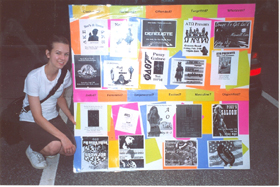Challenging the Image of Duke Parties
Student project raises questions about social climate on campus

As she walked across campus last fall, Claire Lauterbach began noticing a disturbing pattern in the posters that adorn kiosks and bulletin boards to advertise weekend parties.
One pitched a "pimps and ho's" gathering, a second featured "sec's and execs" and a third "the president and the intern." Sexual themes dominated the ads.
"They all portrayed women in a very sexualized capacity," said Lauterbach, a junior. "These are the only real images of women we see in the social scene. I personally didn't feel like this represented all women at Duke, and I was curious to know how other women felt about having other women defined in such a way."
That inspired a year-long effort to collect and display the posters in an exhibit, gather feedback and sponsor discussions about what such images -- typically accepted as a "normal" part of college -- say about Duke's social scene, power dynamics, sexual relationships and the treatment of women.
Lauterbach's effort to inspire conversation about the undergraduate culture is what Duke officials envisioned three years ago when they released the Women's Initiative report. The section on undergraduates described a social scene in which female students feel forced to adhere to stringent social norms, and many described feeling like they have to play by men's rules.
One of the resulting efforts to change that culture is the Baldwin Scholars, a single-sex education program within the larger co-ed experience. While the program is small, with 18 members of each class taking part, directors say the scholars will play a leadership role in influencing campus dialogue. Rather than relying on a top-down approach, administrators hope that other solutions will spring up through the grassroots efforts of students.
Lauterbach, who is a Baldwin Scholar, used the posters as part of a project in Betsy Alden's "Women as Leaders" class. She and a classmate created a survey, which 138 undergraduates returned.
The survey described a number of situations and asked whether the respondents felt "objectified or offended as a woman." For instance, 41 percent of the 46 Class of 2006 respondents said they would be offended by a Playboy-themed party, whle 54 percent said they would be offended by a "pimps and prostitutes" gathering.
Lauterbach and others also held a small group discussion among undergraduates, graduate students and faculty about the posters.
The next step was to widen the dialogue.
To develop an exhibit displaying two dozen party posters, Lauterbach sought the support of the Panhellenic Association, which represents 10 sororities whose members include 40 percent of undergraduate women. Kate Guthrie, a junior and director of public relations for the Panhellenic Association, also approached the governing councils that oversee fraternities and sororities to get their support for the display, which came to be known as the "Images Project." Most of the posters were from fraternities, with a handful from sororities, selective living groups or clubs, Lauterbach said.
"The sororities and fraternities do play a role in the social dynamics of school," Lauterbach said. "We felt like it was only fair to see whether the Interfraternity Council (IFC) was thinking about the situation."
Guthrie said the universal support for the project from IFC, the Inter-Greek Council and the National Pan-Hellenic Council was significant.
"It was a positive step, especially from the Greek perspective, for these groups to come out in public and say these are things we find important," Guthrie said. "The hope is that after having done this, all these groups will think about this project before ever putting anything up."
The exhibit was shown over two weeks this past spring in the Bryan Center, East Campus Union and Wilson Gym. Visitors were encouraged to write responses to the posters in an accompanying notebook. Lauterbach said she was pleased that writers also responded to previous writers, as in a real conversation.
Some women, she said, explained that the posters made them feel objectified. Some alumni writers wondered why undergraduate women would put up with such ads. Some men expressed support for addressing the issue.
However, others, she said, didn't think the posters represent a problem, and some fraternity members said they felt targeted by the display.
The important thing, Lauterbach said, is that her peers are discussing something that had gone largely unnoticed before. She and Guthrie also said that this project has created a strong relationship between the Baldwin Scholars and the Panhellenic Association, a partnership that will be critical in examining women's issues going forward.
What is the next step? Lauterbach, who is studying abroad this semester, said she and others have discussed such ideas as developing a website, offering gender sensitivity workshops for Greek organizations and writing opinion articles for the Chronicle. But, for the moment, no specific plans are underway, though Lauterbach expects the Baldwin Scholars to discuss the ideas in her absence.
"You can't change a social system unless you first talk about it and understand it," Lauterbach said. "I think people are more open to talking about it, but it's hard to face, of course."